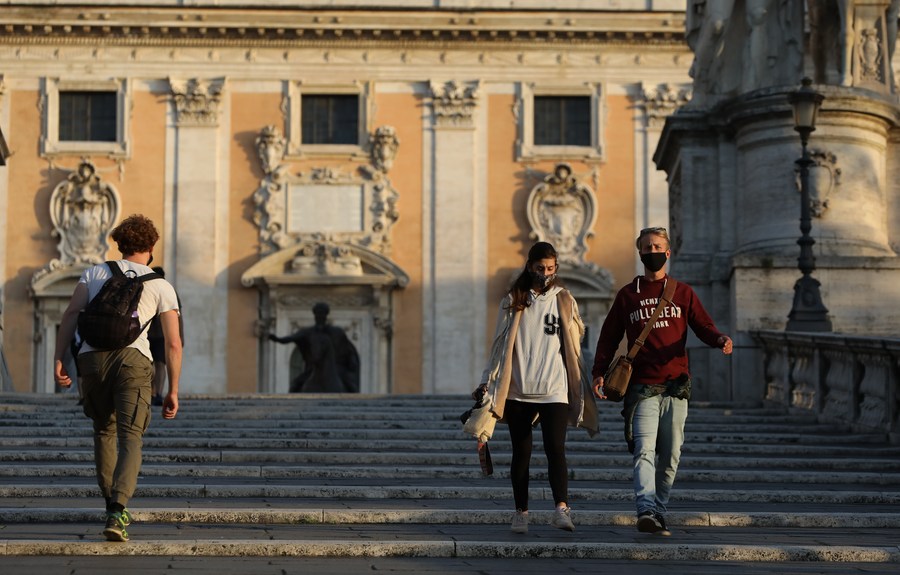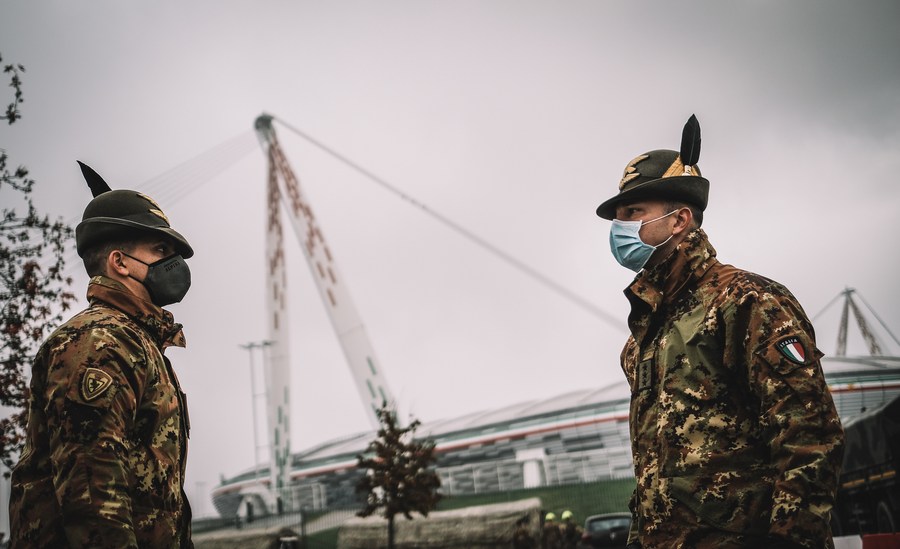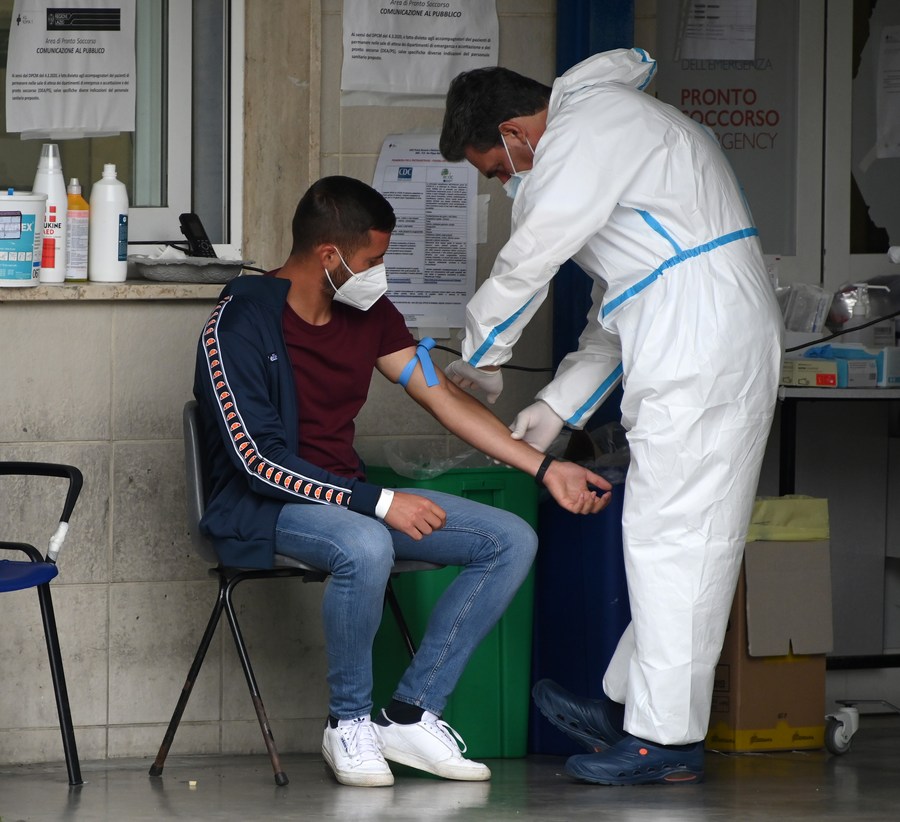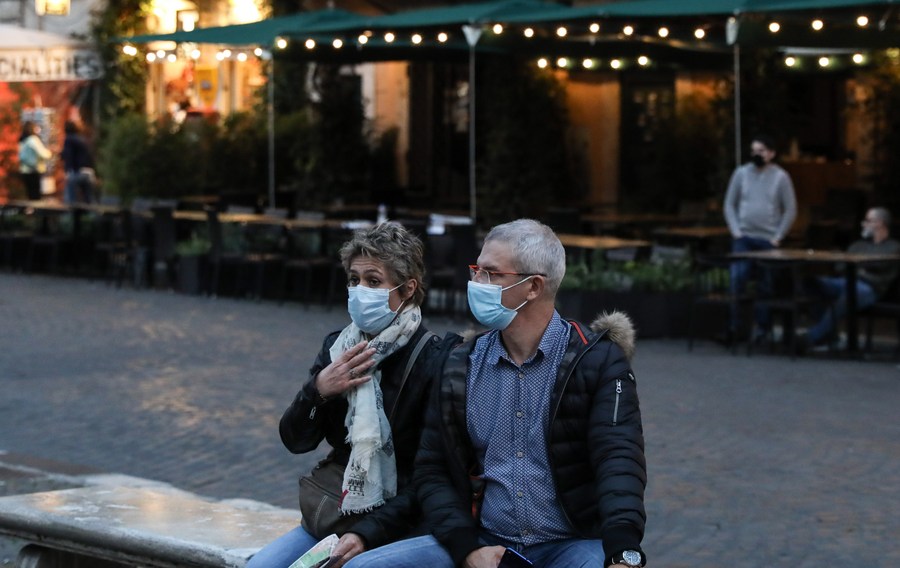
People wearing face masks walk in Rome, Italy, Nov. 10, 2020. (Xinhua/Cheng Tingting)
Matteo Bassetti, head of the infectious disease section at San Martino Hospital in Genoa, told media that the government should start an institutional advertising campaign to help convince more people to use the vaccines when available.
ROME, Nov. 21 (Xinhua) -- While recent news of two separate coronavirus vaccines' clinical results was cause for optimism in Italy, government officials have been working to make sure that Italians have access to the vaccines when available.
A joint venture between the United States' Pfizer and Germany's BioNTech and another project run by pharmaceutical company Moderna have both announced vaccines proven to be over 90 percent effective in trials. Both announcements produced a flood of upbeat news stories in Italy while buoying financial markets.
It is still not clear when the vaccines -- or others in the pipeline -- will be available in the country.
The first concrete hint on the topic came Thursday, when Domenico Arcuri, Italy's extraordinary commissioner for the coronavirus emergency, said Italy will get 3.4 million doses of the Pfizer-BioNTech vaccine in January.
Since the vaccine requires two doses to work, this tranche will be able to vaccinate 1.7 million people -- a fraction of Italy's population of 60 million.

Italian Army soldiers are seen at the building site of a Rapid Antigen Test spot outside the Juventus' Allianz Stadium in Turin, Italy, Nov. 12, 2020. (Photo by Federico Tardito/Xinhua)
Beyond that, things are less certain.
Italy appointed a special health ministry expert advisory panel to help develop strategies for future vaccine rollouts. Franco Locatelli, head of the panel, told reporters earlier in the week that the government will spend money on multiple vaccines in order to ensure the largest available number.
Italy was among the first countries to sign on to the European Union (EU) pact that seeks to reserve large quantities of the most promising vaccines to guarantee access.
So far, the EU has reserved at least 200 million doses of the Pfizer-BioNTech vaccine and it is in talks to acquire at least 80 million doses of the Moderna vaccine.
It has also secured at least 300 million doses of an in-progress vaccine under development by pharmaceutical company AstraZeneca and Oxford University, 300 million doses of an alternative vaccine from GlaxoSmithKline and Sanofi, and another 200 million doses of an in-progress vaccine from Johnson & Johnson.
But there is no timetable to determine how those doses will be allocated to the EU members or when they will be available. The latest information from the European Medicines Agency says the first doses should be available by the end of this year, but numbers are expected to be limited.

A man takes serological examination at the San Filippo Neri Hospital in Rome, Italy, Nov. 2, 2020. (Photo by Alberto Lingria/Xinhua)
Italy has its own potential vaccine being developed by Rome-based biotech company ReiThera, but it is not as close to carrying out advanced clinical trials as some other initiatives.
Italy's 2021 draft budget set aside at least 400 million euros (470 million U.S. dollars) for coronavirus vaccines and the treatment of infected patients.
Problems are not only economic: the Pfizer-BioNTech and Moderna vaccines, for example, must be shipped at temperatures below minus 70 degrees Celsius (minus 94 degrees Fahrenheit), which may make it difficult to transport to remote areas. There are also potential bureaucratic delays, which virologist Roberto Burioni warned "would cost lives."
Additionally, opinion polls have shown high levels of mistrust of vaccinations among Italians -- just under one-third of Italians surveyed said they would be willing to be part of the first rollout of vaccinations, an official from the polling firm Opinioni told Xinhua. Another poll from Euromedia Research said that only one in four Italians was willing to take the step.
Health experts say larger numbers have to be willing to participate in vaccine initiatives. Infectious disease expert Massimo Galli told newspaper that getting vaccinated "is a civic duty."
Matteo Bassetti, head of the infectious disease section at San Martino Hospital in Genoa, told media that the government should start an institutional advertising campaign to help convince more people to use the vaccines when available.

People wearing face masks have a rest at Piazza Navona in Rome, Italy, Oct. 26, 2020. (Xinhua/Cheng Tingting)■



